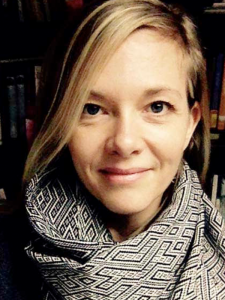Presented By: Center for Southeast Asian Studies
CSEAS Lecture Series. Drawing Borders in Blood: DNA Testing, Citizenship, and Statelessness Prevention in Thailand
Amanda Flaim, Assistant Professor, Michigan State University

Virtual lecture via Zoom Webinar. Please register at:
http://myumi.ch/NxgZN
Despite its authoritarian commitments, the Thai government is regularly lauded by the UN for its statelessness prevention and eradication efforts. Photographs of happy “hill tribe” youth receiving their national ID cards are widely circulated by both the Thai government and human rights advocates, and are often invoked as examples of “best practices” for statelessness prevention. A relatively recent hallmark of this highly celebrated agenda is DNA testing. How is this test performed and adjudicated, and what logics underlie a program that promotes citizenship by blood? More importantly, what are the political and theoretical implications for pursuing these logics in citizenship adjudication? Drawing on extensive ethnographic and survey research, I argue that DNA testing, while “verifying” the citizenship claims of thousands of individuals on case-by-case bases, also produces an increasingly powerful and expansive infrastructure of body/border drawing, maintenance, and surveillance. Moreover, the research indicates that even as state and humanitarian advocates applaud the “objectivity” of DNA tests in adjudication of citizenship claims, the DNA test is carried out in connection with a range of highly contingent, subjective, and uneven practices at individual, local, and bureaucratic levels. Ultimately, the logics that underlie the DNA test are those of ever-expanding, yet ever-incomplete territorialization—a project that seeks complete, but ultimately unattainable, knowledge of, authority over, and reconciliation between individuals to territory.
Amanda Flaim is an Assistant Professor at Michigan State University in James Madison College and the Department of Sociology. She studies problems and paradoxes in human rights and development policy in Southeast Asia among indigenous, highlander, and migrant communities in particular. Her research agendas include the politics of borders, statelessness, and citizenship, labor exploitation and human trafficking discourse, and livelihoods transformations associated with dam development and climate change along the Mekong River.
http://myumi.ch/NxgZN
Despite its authoritarian commitments, the Thai government is regularly lauded by the UN for its statelessness prevention and eradication efforts. Photographs of happy “hill tribe” youth receiving their national ID cards are widely circulated by both the Thai government and human rights advocates, and are often invoked as examples of “best practices” for statelessness prevention. A relatively recent hallmark of this highly celebrated agenda is DNA testing. How is this test performed and adjudicated, and what logics underlie a program that promotes citizenship by blood? More importantly, what are the political and theoretical implications for pursuing these logics in citizenship adjudication? Drawing on extensive ethnographic and survey research, I argue that DNA testing, while “verifying” the citizenship claims of thousands of individuals on case-by-case bases, also produces an increasingly powerful and expansive infrastructure of body/border drawing, maintenance, and surveillance. Moreover, the research indicates that even as state and humanitarian advocates applaud the “objectivity” of DNA tests in adjudication of citizenship claims, the DNA test is carried out in connection with a range of highly contingent, subjective, and uneven practices at individual, local, and bureaucratic levels. Ultimately, the logics that underlie the DNA test are those of ever-expanding, yet ever-incomplete territorialization—a project that seeks complete, but ultimately unattainable, knowledge of, authority over, and reconciliation between individuals to territory.
Amanda Flaim is an Assistant Professor at Michigan State University in James Madison College and the Department of Sociology. She studies problems and paradoxes in human rights and development policy in Southeast Asia among indigenous, highlander, and migrant communities in particular. Her research agendas include the politics of borders, statelessness, and citizenship, labor exploitation and human trafficking discourse, and livelihoods transformations associated with dam development and climate change along the Mekong River.
